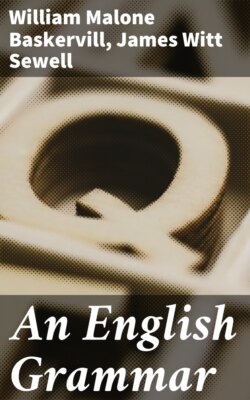Читать книгу An English Grammar - James Witt Sewell - Страница 14
На сайте Литреса книга снята с продажи.
III. Gender shown by Different Words.
ОглавлениеTable of Contents
32. In some of these pairs, the feminine and the masculine are entirely different words; others have in their origin the same root. Some of them have an interesting history, and will be noted below:—
bachelor—maid
boy—girl
brother—sister
drake—duck
earl—countess
father—mother
gander—goose
hart—roe
horse—mare
husband—wife
king—queen
lord—lady
wizard—witch
nephew—niece
ram—ewe
sir—madam
son—daughter
uncle—aunt
bull—cow
boar—sow
Girl originally meant a child of either sex, and was used for male or female until about the fifteenth century.
Drake is peculiar in that it is formed from a corresponding feminine which is no longer used. It is not connected historically with our word duck, but is derived from ened (duck) and an obsolete suffix rake (king). Three letters of ened have fallen away, leaving our word drake.
Gander and goose were originally from the same root word. Goose has various cognate forms in the languages akin to English (German Gans, Icelandic gás, Danish gaas, etc.). The masculine was formed by adding -a, the old sign of the masculine. This gansa was modified into gan-ra, gand-ra, finally gander; the d being inserted to make pronunciation easy, as in many other words.
Mare, in Old English mere, had the masculine mearh (horse), but this has long been obsolete.
Husband and wife are not connected in origin. Husband is a Scandinavian word (Anglo-Saxon hūsbonda from Icelandic hús-bóndi, probably meaning house dweller); wife was used in Old and Middle English to mean woman in general.
King and queen are said by some (Skeat, among others) to be from the same root word, but the German etymologist Kluge says they are not.
Lord is said to be a worn-down form of the Old English hlāf-weard (loaf keeper), written loverd, lhauerd, or lauerd in Middle English. Lady is from hlœ̄̄fdige (hlœ̄̄f meaning loaf, and dige being of uncertain origin and meaning).
Witch is the Old English wicce, but wizard is from the Old French guiscart (prudent), not immediately connected with witch, though both are ultimately from the same root.
Sir is worn down from the Old French sire (Latin senior). Madam is the French ma dame, from Latin mea domina.
Two masculines from feminines.
33. Besides gander and drake, there are two other masculine words that were formed from the feminine:—
Bridegroom, from Old English brȳd-guma (bride's man). The r in groom has crept in from confusion with the word groom.
Widower, from the weakening of the ending -a in Old English to -e in Middle English. The older forms, widuwa—widuwe, became identical, and a new masculine ending was therefore added to distinguish the masculine from the feminine (compare Middle English widuer—widewe).
